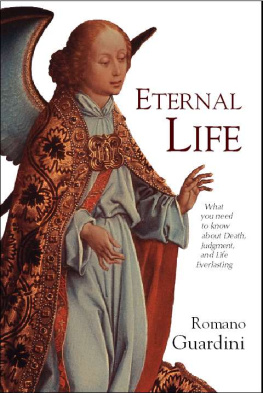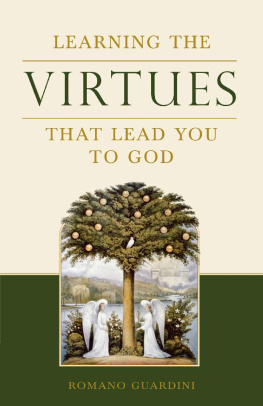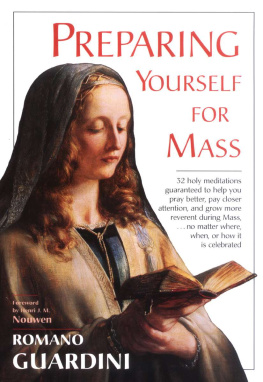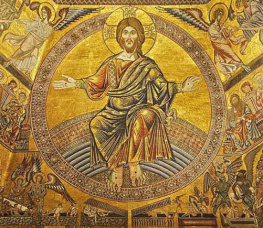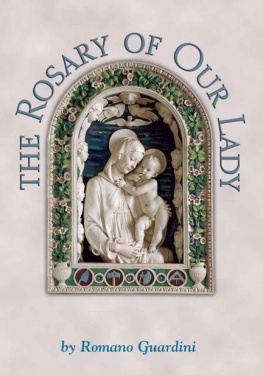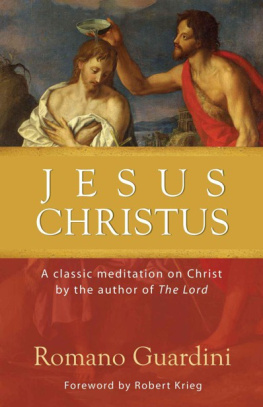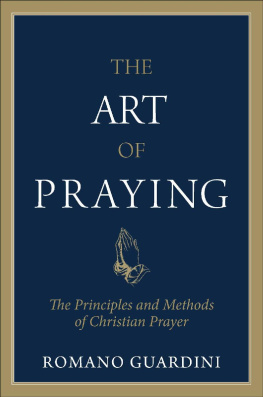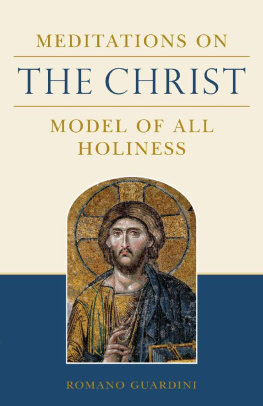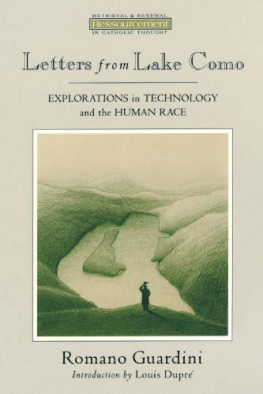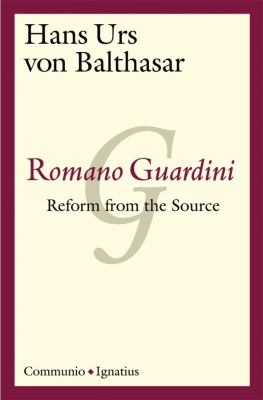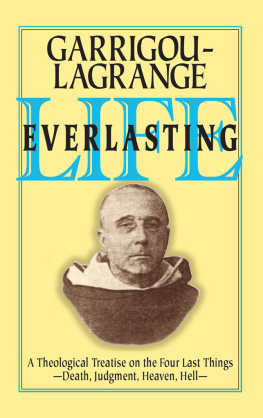Romano Guardini - Eternal Life: What You Need to Know About Death, Judgment, and Life Everlasting
Here you can read online Romano Guardini - Eternal Life: What You Need to Know About Death, Judgment, and Life Everlasting full text of the book (entire story) in english for free. Download pdf and epub, get meaning, cover and reviews about this ebook. year: 2011, publisher: Sophia Institute Press, genre: Science. Description of the work, (preface) as well as reviews are available. Best literature library LitArk.com created for fans of good reading and offers a wide selection of genres:
Romance novel
Science fiction
Adventure
Detective
Science
History
Home and family
Prose
Art
Politics
Computer
Non-fiction
Religion
Business
Children
Humor
Choose a favorite category and find really read worthwhile books. Enjoy immersion in the world of imagination, feel the emotions of the characters or learn something new for yourself, make an fascinating discovery.
- Book:Eternal Life: What You Need to Know About Death, Judgment, and Life Everlasting
- Author:
- Publisher:Sophia Institute Press
- Genre:
- Year:2011
- Rating:5 / 5
- Favourites:Add to favourites
- Your mark:
- 100
- 1
- 2
- 3
- 4
- 5
Eternal Life: What You Need to Know About Death, Judgment, and Life Everlasting: summary, description and annotation
We offer to read an annotation, description, summary or preface (depends on what the author of the book "Eternal Life: What You Need to Know About Death, Judgment, and Life Everlasting" wrote himself). If you haven't found the necessary information about the book — write in the comments, we will try to find it.
Romano Guardini: author's other books
Who wrote Eternal Life: What You Need to Know About Death, Judgment, and Life Everlasting? Find out the surname, the name of the author of the book and a list of all author's works by series.
Eternal Life: What You Need to Know About Death, Judgment, and Life Everlasting — read online for free the complete book (whole text) full work
Below is the text of the book, divided by pages. System saving the place of the last page read, allows you to conveniently read the book "Eternal Life: What You Need to Know About Death, Judgment, and Life Everlasting" online for free, without having to search again every time where you left off. Put a bookmark, and you can go to the page where you finished reading at any time.
Font size:
Interval:
Bookmark:


Other books available
from Sophia Institute Press
by Romano Guardini:
The Lords Prayer
The Rosary of Our Lady
Learning the Virtues That Lead You to God
Preparing Yourself for Mass
The Art of Praying
The Living God

Eternal Life: What You Need to Know About Death, Judgment, and Life Everlasting was published in 1940 and in 1966 by Werkbund-Verlag, Wrzburg, Germany, under the title Die Letzten Dinge: Die christliche Lehre vom Tode, der Luterung nach dem Tode, Auferstehung, Gericht und Ewigkeit . Pantheon Books in New York published an English translation in 1954. This 1998 edition by Sophia Institute Press uses Pantheons 1954 translation by Charlotte E. Forsyth and Grace B. Branham, entitled The Last Things , with slight revisions to that text.
Copyright 1989 Matthias-Grnewald, Mainz
(second paperback edition 1995)
All of the rights of the Author are vested
in the Catholic Academy in Bavaria.
English translation Copyright 1954 by Random House, Inc.
This translation published by arrangement with Pantheon Books,
a Division of Random House, Inc.
Printed in the United States of America
All rights reserved
Jacket design by Joan Barger
The cover painting is a detail of The Annunciation, by Roger van
der Weyden (c. 13991464), in the Louvre, Paris (Superstock).
No part of this book may be reproduced, stored in a retrieval system, or transmitted in any form, or by any means, electronic, mechanical, photocopying, or otherwise, without the prior written permission of the publisher, except by a reviewer, who may quote brief passages in a review.
Sophia Institute Press
Box 5284, Manchester, NH 03108
1-800-888-9344
Nihil Obstat: Herman Branderis, Censor Librorum
Imprimatur: Peter L. Ireton, Bishop of Richmond
Richmond, Virginia, January 18, 1954
Library of Congress Cataloging-in-Publication Data
Guardini, Romano, 18851968.
[Letzten Dinge. English]
Eternal life: what you need to know about death, judgment, and life everlasting / Romano Guardini.
p. cm.
This 1998 edition by Sophia Institute Press uses Pantheons 1954 translation by Charlotte E. Forsyth and Grace B. Branham, entitled The last things, with slight revisions to that textT.p. verso.
ISBN 0-918477-69-7 (pbk. : alk. paper)
1. Eschatology. 2. Catholic ChurchDoctrines. I. Guardini, Romano, 18851968. Last things. II. Title.
BT821.G8213 1998
| 236DC21 | 97-51872 CIP |
Contents
It is by time that life is made actual. In this conditioning by time, three divisions appear not only clearly but decisively: the beginning, the end, and the present moment. The beginning and the end mark the limits of existence as a whole. In the moment, existence gathers itself, approaches the living man, gives itself into his hands, and from his free decision receives its permanent meaning.
If understood according to the gospel, these three divisions of time furnish the fundamental principles of a Christian doctrine concerning existence in time. The beginning: about each mans beginning and about the beginning of the world in which man lives and which fulfills itself in man. The end: about the conclusion of each mans life, and about the end of the world that is ordered with reference to man. Finally, the moment: about time becoming the present in its fleeting course, thereby entrusting existence to man in irrevocable, unalterable, unique fashionthat is, his own existence and that of the world related to him. If we apply and extend the usual terminology, these three divisions of the Christian doctrine concerning existence in time are called archelogy, eschatology, and kairology.
In this study, I shall try to outline what Christianity teaches concerning the end and that which pertains to itdeath, resurrection, purification after death, the Last Judgment, and eternal life.
It is, in fact, only an outline. I am not aiming to present an exhaustive survey, but rather to focus on certain points from which the subject may appear more definite and intelligible. Christian eschatology discusses things which in part are very remote from modern sensibility. The changes wrought in our view of the universe and in our sensation of life have given rise, on these points especially, to much questioning and opposition. Instead of treating the subject in the fullest manner, then, I shall confine myself to establishing a relationship between the timeless teaching of Revelation and our present spiritual and intellectual situation.
Romano Guardini
Berlin, Advent 1940

In the short space of this first chapter something will be said of the Christian teaching about deatha great theme not easy to exhaust. It will be in place, therefore, to bring out at once the sharp differences between the Christian view of death and current notions.
Paul says in his letter to the Romans, Through one man sin entered into the world and through sin death, and thus death has passed unto all men because [in that first man] all have sinned.
The modern reader is inclined to accept the passage in a fairly general senseeither in the ethical sense: that the first man did wrong, and by so doing injured himself and his posterity radically; or in the vaguely religious sense: that in forsaking God, the first man destroyed the life of the soul, or something of the sort. In reality, the passage means precisely what it says. That it does so appears with particular clearness when it is set beside another important passage on death, in the second chapter of Genesis: And the Lord God took man, and put him into the paradise of pleasure to dress it and to keep it. And He commanded him, saying, Of every tree of paradise, thou shalt eat, but of the tree of the knowledge of good and evil, thou shalt not eat. For in what day soever thou shalt eat of it thou shalt die the death. Paul merely follows what was said in Genesis, and both passages express the same thing: that man, originally, and in the intention of his Creator, should not have died.
To the modern reader this statement is little short of nonsense. He has been taught by science to regard death as a natural necessity and in consequence to look on death as a natural part of life. Indeed, in recent decades an attitude has grown up about which much could be said, and which virtually amounts to a surrender to death. A protest is in order, for although Revelation is a mystery, it is not a fairy tale. It is divine truth, transcending reason, but still truth. Consciences must not suppose that they may be forced by divine authority to accept nonsense, and Christians should perceive that they have been admitted to a higher view than that of natural science, which, although mysterious, is yet real.

Death is the last part of human life. But for everything alive it is this last part which is crucial. Our nature is patterned on a process in which the end is part of the whole. This end is not like the last few drops poured out of a cup to signify that there is no more. The end determines all that precedes it. There is a proverb, Alls well that ends well. The obvious meaning is that if the end turns out happy, the rest will come right somehow. But in a deeper sense, if the end comes right, it is through the concurrence of the whole, and in a good ending the whole acquires its validity. It is in the last notes that a melody is first present as a whole. In a play, it is not until the outcome that the heros character is fully illumined. So, too, death brings mans life to its fulfillmentfor good or ill. How, then, can Paul say that had there been no sin, there would have been no death?
Font size:
Interval:
Bookmark:
Similar books «Eternal Life: What You Need to Know About Death, Judgment, and Life Everlasting»
Look at similar books to Eternal Life: What You Need to Know About Death, Judgment, and Life Everlasting. We have selected literature similar in name and meaning in the hope of providing readers with more options to find new, interesting, not yet read works.
Discussion, reviews of the book Eternal Life: What You Need to Know About Death, Judgment, and Life Everlasting and just readers' own opinions. Leave your comments, write what you think about the work, its meaning or the main characters. Specify what exactly you liked and what you didn't like, and why you think so.

